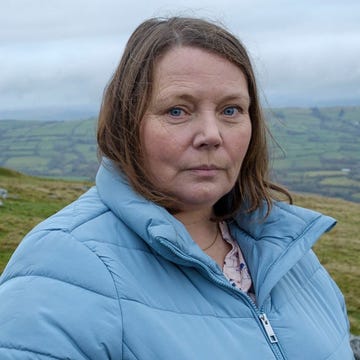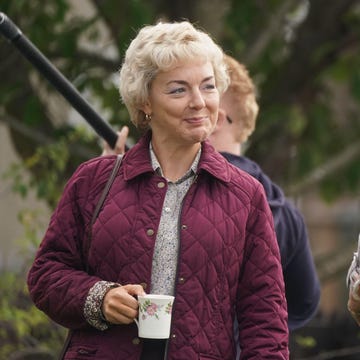Even now, I remember the spot where my mother confronted my father with the evidence he had resumed his affair with his mistress. It was a stifling summer’s day in 1976. From my seat on the swing at the other end of the garden, I can still see him squatting down, head in his hands, staring into the black water of our garden pond while my mother stood above him, calmly delivering her coup de grâce. The recriminations were drowned out by 10cc’s I’m Not In Love drifting over from a neighbour’s radio.
I could already guess what it meant: the end of my parents’ marriage. Today, I’m a happily married mother of two, and this was almost 50 years ago. But I know I’m not alone in still feeling the aftershocks. I was part of the wave of children to experience divorce in the 1970s, when the number of marital breakdowns tripled to 150,000 by the end of the decade due to changing attitudes to sex and marriage, and liberalised divorce laws.
Of course, back then, the message was that children were ‘resilient’. I imagine that when my father arranged that romantic getaway with the ‘other woman’, my future emotional wellbeing was not top of his priorities. This time, he’d told my mother he needed to make a business trip before starting a new job in Australia, where we were supposed to emigrate to for a fresh start.
By now, my mother’s well-honed sixth sense told her something wasn’t right. She visited the workplace of the mistress he’d promised to finish with, only to find she was also on holiday. It was no coincidence. When my father got back, my mother searched his glove compartment and found ferry tickets. They’d been away together to France.
Although my mother pretended to forgive him, it was the final blow. She let him get on the plane to Australia, promising we’d follow, but a few weeks later she told him we weren’t coming. I thought he’d fly back to get me. He never did. Instead, he flew his mistress out to join him and later married her. It was the end of my childhood as I knew it.
Although I’ve long been dimly aware of its impact, it wasn’t until I started training as a psychotherapist two years ago that I realised how much it shook my trust in the world and how hard it’s been to regain it. It wasn’t always this way. By my 20s, I believed that I ‘should’ have got over my childhood.
In fact, I convinced myself I had. After all, my career was going well; I’d thrown myself into my job as a journalist and worked hard.
I counted myself fortunate that I seemed to have developed the qualities that made me good at my job: independence, toughness and a keen eye for detail. I could read people. I was cynical. I asked the difficult questions. Plus, what right did I have to make a fuss? Lots of other people had divorced parents. I hadn’t been abused. And while my parents’ marriage was acrimonious, I hadn’t seen any physical blows.
In fact, compared with others, my upbringing seemed privileged. Yet when I looked ahead to having my own children, I knew one thing: I didn’t want them to experience the unstable childhood I’d had. Against the odds, I was determined to break the cycle. So I deliberately avoided men who I felt had the potential to be unfaithful like my father. When I was 33, I married my husband, Anthony, who I chose partly because of his family values and because I knew he would never betray me or our children.
And when we did have two daughters of our own (now 23 and 20), through my parenting books I spoke from personal experience when I urged parents not to be hijacked by the tumultuous emotions they were going through and to always put their children’s emotional needs first. As I did so, the research into the effects of high-conflict divorce was also growing.
In 2013, the bible of mental health, the Diagnostic And Statistical Manual Of Mental Disorders, began to include a condition known as CAPRD: child affected by parental relationship distress. It recognised that children exposed to ongoing hostility between parents can develop symptoms including anxiety and depression, as well as dissociation and emotional unavailability, to protect themselves.
Scans started to show how the brains of children who often witnessed aggression at home, verbal or otherwise, developed differently. They were found to have changes in the amygdala, the region crucial for threat detection and emotional processing. As a result, they can keep feeling hypervigilant to threat, even when the conflict has passed.
Even so, I still didn’t realise how deeply my own survival strategies ran through me until I began training as a Gestalt psychotherapist two years ago, at the age of 55. This therapy emphasises the importance of maintaining a calm presence with clients. But as I tried to slow down and regulate my nervous system, I realised I was struggling to stay in the moment. I found silence in sessions difficult to sit with. While I was deeply empathetic with clients, I noticed that, when it came to myself, I was more comfortable ‘thinking’ than ‘feeling’ – because cognitive ‘work’ had always been my safe place to escape to.
When I shared this with my supervisor, whose job it is to guide me through my training, she said something that stopped me in my tracks: ‘It sounds like complex PTSD.’ While I knew my childhood had been difficult, her words took me aback. I’d associated trauma with events such as war, disasters, poverty and violence. But as I dug deeper into what this meant for me, I learnt that trauma isn’t just about isolated dramatic events.
In the case of complex PTSD, it can also be cumulative, the result of chronic emotional insecurity or unmet needs that a child never recovers from. You can grow up in a home where no shots are fired or blows are exchanged, and still come out of it shellshocked.
As psychotherapist Philippa Smethurst, author of 20 Ways To Break Free From Trauma, explains: ‘Cumulative trauma can occur when our needs are not met over time. Because trauma may be the ongoing reality of our lives, it can be hard to spot. We may be hurt but not have space to acknowledge it, so we push the hurt down. We may still dismiss what we’ve been through in order to survive.’
Psychoanalyst Juliet Rosenfeld wrote her recent book Affairs partly because she’s seen the impact on women still devastated by their parents’ divorce into their 30s, 40s and beyond. ‘If you can’t trust your mum or dad, who can you trust? The legacy of a complex separation in childhood, and especially infidelity in one or both parents, can last decades. It can feel like a betrayal of everything you’re told to trust and believe in. It’s only as adults that we can understand our parents as faulty human beings, prone to mistakes and with feet of clay. But by then the damage may already be done, and it takes a lot of working through in therapy.’
It doesn’t matter how old we are either, adds psychotherapist Phillip Hodson. ‘Time does not heal all things by itself. It’s irrelevant to emotional pain. You can’t turn back the clock. But you can name the feelings and admit that your parents did not meet your needs.’
What can you do to process complex trauma? Like me, you may need to grieve the childhood you didn’t have and come to terms with the fact you can’t go back and rewrite your story. And it’s probably too late to ask the main protagonists why they behaved as they did.
But you’re no longer a powerless child ruled by the grown-ups who raised you. Now you get to choose how you live your life. As a therapist-in-training, I listen out for the inner voices that tell me I must work around the clock to be worthy, or I can’t trust anyone but myself. I can finally say to those voices: ‘Thank you. But I don’t need your protection anymore. I’m safe. I’m happy. And now I’m the grown-up in charge of my life.’
Tanith Carey (@tanithcareytherapy) is author of Feeling ‘Blah’? Why Life Feels Joyless And How To Recapture Its Highs













![©ITV from monumental television frauds sr1pictured: jodie whittaker as sam suranne jones as bert this photograph is (c) itv plc/ monumental television and can only be reproduced for editorial purposes directly in connection with the programme or event mentioned above, or itv plc. this photograph must not be manipulated [excluding basic cropping] in a manner which alters the visual appearance of the person photographed deemed detrimental or inappropriate by itv plc picture desk. this photograph must not be syndicated to any other company, publication or website, or permanently archived, without the express written permission of itv picture desk. full terms and conditions are available on the website www.itv.com/presscentre/itvpictures/termsfor further information please contact:michael.taiwo1@itv.com](https://hips.hearstapps.com/hmg-prod/images/frauds-sr1-first-look-03-6891d81c2d536.jpg?crop=0.428xw:0.643xh;0.0641xw,0.116xh&resize=360:*)